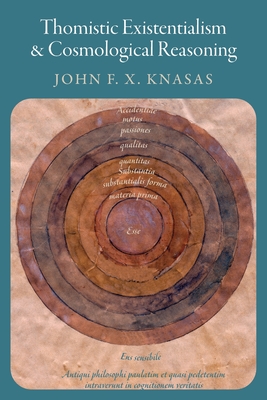Thomistic Existentialism and Cosmological Reasoning

Thomistic Existentialism and Cosmological Reasoning
Cosmological reasoning is an important facet of classical arguments for the existence of God, but these arguments have been subject to may criticisms. The thesis of this book is that Thomas Aquinas can dodge many of the classic objections brought against cosmological reasoning. These objections criticize cosmological reasoning for its use of the Principle of Sufficient Reason; its notion of existence as a predicate; its use of ontological reasoning; its reliance on sense realism; its ignoring of the problem of evil; and its susceptibility to the critique of "ontotheology" as famously put forward by Heidegger. All of these objections receive a reply, showing that Aquinas's De Ente et Essentia reasoning for God as esse tantum employs a more nuanced understanding of a thing's existence than is found in Leibniz's classic cosmological arguments.
Secondly, the book proposes that the kind of reasoning found in Aquinas's De Ente can be formulated in a more robust version. Prompted by Aquinas's admissions that philosophical knowledge of God is the prerogative of metaphysics, the second main portion of the book extensively illustrates how the more robust version of the De Ente is the interpretive key for Aquinas's many arguments for God. Hence, the book should be of interest both to philosophers engaged in cosmological reasoning discussion and to Thomists interested in understanding Aquinas's viae to God.
Finally, the deep purpose of the book is to reawaken interest in Thomistic Existentialism, an interpretation of Aquinas that flourished in the 1950's in the works of Etienne Gilson, Jacques Maritain, and Joseph Owens. In this interpretation, a particular thing's existence is the actuality of the thing in the sense of a distinctive actus not translatable into something else, for example, the fact of the thing or the thing having form. This book clearly explains how this interpretation looks at Thomas's metaphysics, and why it helps illuminate metaphysical realities.
PRP: 288.92 Lei
Acesta este Pretul Recomandat de Producator. Pretul de vanzare al produsului este afisat mai jos.
260.03Lei
260.03Lei
288.92 LeiLivrare in 2-4 saptamani
Descrierea produsului
Cosmological reasoning is an important facet of classical arguments for the existence of God, but these arguments have been subject to may criticisms. The thesis of this book is that Thomas Aquinas can dodge many of the classic objections brought against cosmological reasoning. These objections criticize cosmological reasoning for its use of the Principle of Sufficient Reason; its notion of existence as a predicate; its use of ontological reasoning; its reliance on sense realism; its ignoring of the problem of evil; and its susceptibility to the critique of "ontotheology" as famously put forward by Heidegger. All of these objections receive a reply, showing that Aquinas's De Ente et Essentia reasoning for God as esse tantum employs a more nuanced understanding of a thing's existence than is found in Leibniz's classic cosmological arguments.
Secondly, the book proposes that the kind of reasoning found in Aquinas's De Ente can be formulated in a more robust version. Prompted by Aquinas's admissions that philosophical knowledge of God is the prerogative of metaphysics, the second main portion of the book extensively illustrates how the more robust version of the De Ente is the interpretive key for Aquinas's many arguments for God. Hence, the book should be of interest both to philosophers engaged in cosmological reasoning discussion and to Thomists interested in understanding Aquinas's viae to God.
Finally, the deep purpose of the book is to reawaken interest in Thomistic Existentialism, an interpretation of Aquinas that flourished in the 1950's in the works of Etienne Gilson, Jacques Maritain, and Joseph Owens. In this interpretation, a particular thing's existence is the actuality of the thing in the sense of a distinctive actus not translatable into something else, for example, the fact of the thing or the thing having form. This book clearly explains how this interpretation looks at Thomas's metaphysics, and why it helps illuminate metaphysical realities.
Detaliile produsului








